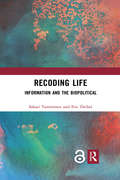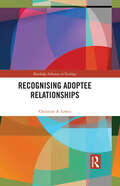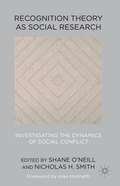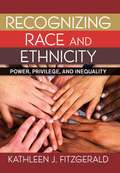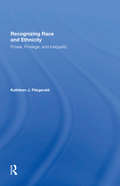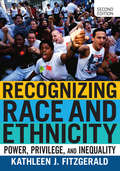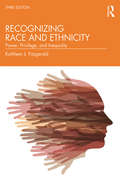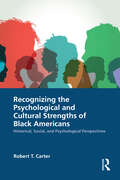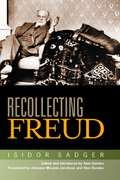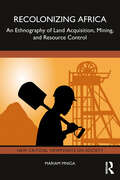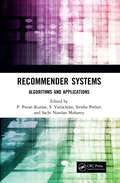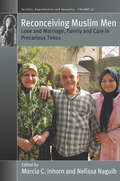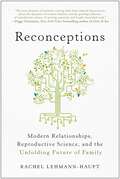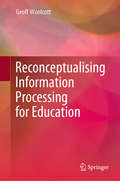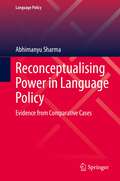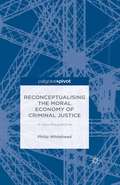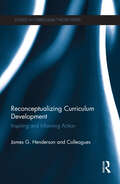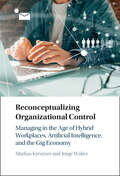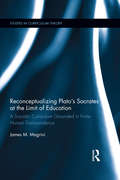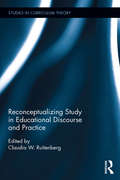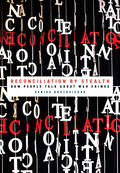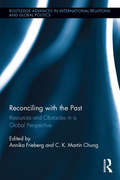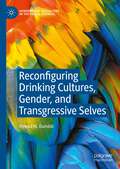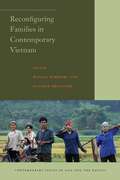- Table View
- List View
Recoding Life: Information and the Biopolitical
by Sakari Tamminen Eric DeibelThis book addresses the unprecedented convergence between the digital and the corporeal in the life sciences and turns to Foucault’s biopolitics in order to understand how life is being turned into a technological object. It examines a wide range of bioscientific knowledge practices that allow life to be known through codes that can be shared (copied), owned (claimed, and managed) and optimised (remade through codes based on standard language and biotech engineering visions). The book’s approach is captured in the title, which refers to 'the biopolitical'. The authors argue that through discussions of political theories of sovereignty and related geopolitical conceptions of nature and society, we can understand how crucially important it is that life is constantly unsettling and disrupting the established and familiar ordering of the material world and the related ways of thinking and acting politically. The biopolitical dynamics involved are conceptualised as the 'metacode of life', which refers to the shifting configurations of living materiality and the merging of conventional boundaries between the natural and artificial, the living and non-living. The result is a globalising world in which the need for an alternative has become a core part of its political and legal instability, and the authors identify a number of possible alternative platforms to understand life and the living as framed by the 'metacodes' of life. This book will appeal to scholars of science and technology studies, as well as scholars of the sociology, philosophy, and anthropology of science, who are seeking to understand social and technical heterogeneity as a characteristic of the life sciences.
Recognising Adoptee Relationships (Routledge Advances in Sociology)
by Christine A. LewisWith a triadic perspective, this autoethnographic narrative explores the temporal, situated nature of interactions between the author as an adoptee with her adult adopted children as well as those between herself and her birth father and mother. The epiphanic adoptive family narratives that are foregrounded seek to deepen and challenge understanding of how kinship affinities are experienced. The autoethnographic narratives are written in a critical, evocative style which is valuable for two reasons. Firstly, the processes of reflexive self-introspection, self-observation and dialogue with relational others have established a critical connection between recognising and responding to kinship affinities and personal growth. Secondly, lying at the intersection of the self and other this narrative contributes to deepening insights around epistemic in/justice in adoptive kinship. This book will be of interest to educators and scholars of adoption in offering an insider perspective on unique family relationships as well as how the author undertakes critical evocative autoethnography. Adoptees, adoptive parents, and birth parents will also find the narratives in Part II of this book of particular interest in informing an understanding of kin relationships and how these may be subject to change over time.
Recognition Theory as Social Research
by Nicholas H. Smith Shane O�neillPresents the case for an exciting new research program in the social sciences based on the theory of recognition developed by Axel Honneth and others in recent years. The theory provides a frame for revealing new insights about conflicts and the potential of recognition theory to guide just resolutions of these conflicts is also explored.
Recognizing Race and Ethnicity
by Kathleen FitzgeraldDespite radical changes over the last century, race remains a central organizing principle in U.S. society, a key arena of inequality, and the subject of ongoing conflict and debate. In a refreshing new introduction to the sociology of race, Recognizing Race and Ethnicity encourages students to think differently by challenging the notion that we are, or should even aspire to be, color-blind. In this text, Kathleen J. Fitzgerald considers how the continuing significance of race manifests in both significant and obscure ways by looking across all racial/ethnic groups within the socio-historical context of institutions and arenas, rather than discussing each group by group. Incorporating recent research and contemporary theoretical perspectives, she guides students to examine racial ideologies and identities as well as structural racism; at the same time, she covers topics like popular culture, sports, and interracial relationships that will keep students engaged. Recognizing Race and Ethnicity provides unparalled coverage of white privilege while remaining careful to not treat "white" as the norm against which all other groups are defined. Recognizing Race and Ethnicity makes it clear that, in a time when race and racism are constantly evolving in response to varied social contexts, societal demands, and political climates, we all must learn to recognize race if we are to get beyond it.
Recognizing Race and Ethnicity
by Kathleen J. FitzgeraldDespite radical changes over the last century, race remains a central organizing principle in U. S. society, a key arena of inequality, and the subject of ongoing conflict and debate. In a refreshing new introduction to the sociology of race, Recognizing Race and Ethnicity encourages students to think differently by challenging the notion that we are, or should even aspire to be, color-blind. In this text, Kathleen Fitzgerald considers how the continuing significance of race manifests in both significant and obscure ways by looking across all racial/ethnic groups within the socio-historical context of institutions and arenas, rather than discussing each group by group. Incorporating recent research and contemporary theoretical perspectives, she guides students to examine racial ideologies and identities as well as structural racism; at the same time, she covers topics like popular culture, sports, and interracial relationships that will keep students engaged. Recognizing Race and Ethnicity provides unparalled coverage of white privilege while remaining careful to not treat "white" as the norm against which all other groups are defined. Recognizing Race and Ethnicity makes it clear that, in a time when race and racism are constantly evolving in response to varied social contexts, societal demands, and political climates, we all must learn to recognize race if we are to get beyond it.
Recognizing Race and Ethnicity, Student Economy Edition: Power, Privilege, and Inequality
by Kathleen FitzgeraldTo better reflect the current state of research in the sociology of race/ethnicity, this book places significant emphasis on white privilege, the social construction of race, and theoretical perspectives for understanding race and ethnicity.
Recognizing Race and Ethnicity: Power, Privilege, and Inequality
by Kathleen J. FitzgeraldDespite promising changes over the last century, race remains a central organizing principle in US society, a key arena of inequality, power, and privilege, and the subject of ongoing conflict and debate. In this second edition of Recognizing Race and Ethnicity, Kathleen J. Fitzgerald continues to examine the sociology of race and encourages students to think differently by challenging the notion that we are, or should even aspire to be, color-blind.Fitzgerald considers how race manifests in both significant and obscure ways by looking across all racial/ethnic groups within the socio-historical context of institutions and arenas, rather than discussing each group by group. Incorporating recent research and contemporary theoretical perspectives, she guides students to examine racial ideologies and identities as well as structural racism; at the same time, she covers topics like popular culture, sports, and interracial relationships.This latest edition includes an expanded look at global perspectives on racial inequality, including international migration and Islamophobia; updated examples of contemporary issues, including the Black Lives Matter movement; more emphasis on intersectionality, specifically the ways sexuality and race intersect; and an extended discussion on why the sociology of race and the sociological imagination matter. Recognizing Race and Ethnicity continues to reflect the latest sociological research on race/ethnicity and provides unparalleled coverage of white privilege while remaining careful not to treat "white” as the norm against which all other groups are defined.
Recognizing Race and Ethnicity: Power, Privilege, and Inequality
by Kathleen J. FitzgeraldThis best-selling textbook explains the current state of research in the sociology of race/ethnicity, emphasizing white privilege, the social construction of race, and the newest theoretical perspectives for understanding race and ethnicity. It is designed to engage students with an emphasis on topics that are meaningful to their lives, including sports, popular culture, interracial relationships, and biracial/multiracial identities and families. The new third edition comes at a pivotal time in the politics of race and identity. Fitzgerald includes vital new discussions on white ethnicities and the politics of Trump and populism. Prominent attention is given to immigration and the discourse surrounding it, police and minority populations, and the criminal justice system. Using the latest available data, the author examines the present and future of generational change. New cases studies include athletes and racial justice activism, removal of Confederate monuments, updates on Black Lives Matter, and Native American activism at Standing Rock and against the Bayou Bridge pipeline.
Recognizing the Psychological and Cultural Strengths of Black Americans: Historical, Social and Psychological Perspectives
by Robert T. CarterThis book examines the cultural beliefs and practices of Black folks in relation to psychological strength.Divided into four parts, the book begins with a discussion on the history of African civilizations, including an analysis of faiths, architecture, and cultural diversity of the continent, followed by a meaningful dialogue on the history of slavery and plantations in North America. The later sections are a study on the contribution of the African American community towards America’s prosperity. The book explores cultural values as a source of power, and uses historical, social, and psychological research to construct a framework of Black cultural values and psychological resolve. The author offers practical applications and interventions to demonstrate how this framework can be applied to training and policy matters on both individual and systemic levels.Recognizing the Psychological and Cultural Strengths of Black Americans is essential reading for students and academics in the fields of Psychology, Sociology, Critical Race Theory, Political Science, and other related disciplines. It will also be a useful resource for professionals including policy makers, psychologist, counsellors, educators, and social workers.
Recollecting Freud
by Isidor SadgerAvailable here for the first time in English, this eyewitness account by one of Freuds earliest students has been rediscovered for twenty-first century readers. Isidor Sadgers recollections provide a unique window into the early days of the psychoanalytic movement the internecine and ideological conflicts of Freuds disciples. They also illuminate Freuds own struggles: his delight in wit, his attitudes toward Judaism, and his strong opinions concerning lay, non-medical analysts. As a student, Sadger attended Freuds lectures from 1895 through 1904. Two years later Freud nominated Sadger to his Wednesday Psychological Society (later called the Viennese Psychoanalytic Society). Sadger, however, was not part of Freuds inner circle, but more a participant observer of the early years of the psychoanalytic movement and of Freud as teacher, therapist, and clinician. Sadger was considered one of the most devoted followers of Freud and hoped to become one of Freuds "favorite sons. " At the First Psychoanalytic Congress held in Salzburg in 1908, Sadger was chosen to be one of the principal speakers along with Freud, Jones, Alder, Jung, Prince, Rifkin, Abraham, and Stekel, an honor that bespeaks Sadgers early role in the movement. But Freud and many of his disciples were also openly critical of Sadgers work, calling it at various times overly simplistic, unimaginative, reductionist, orthodox, and rigid. In 1930 Sadger published his memoir, Sigmund Freud: Persönliche Erinnerungen. With the rise of Nazism and World War II, the book became lost to the world of psychoanalytic history. Recently, Alan Dundes learned of its existence and mounted a search that led him around the world to one of the few extant copies in a research library in Japan. The result of his fascinating quest is Recollecting Freud, a long-lost personal account that provides invaluable insights into Freud and his social, cultural, and intellectual context.
Recolonizing Africa: An Ethnography of Land Acquisition, Mining, and Resource Control (New Critical Viewpoints on Society)
by Mariam MnigaExplaining how the legacy of colonialism and the nature of the liberal economy play a significant role in the development of Africa today, keeping Africa poor and dependent, this book explains how trade liberalization, deregulation, and privatization had opened doors for the New Scramble for Africa.Green technology and the high demand for electronics have intensified Africa’s role as a supplier of raw materials, natural resources, and cheap labor and as a large market of more than one billion people in the global economy. This unique ethnographic study, with elements of autoethnography, starts with the author's journey to Bulyanhulu, Tanzania, one of the largest gold mines in Africa, and moves to a broader analysis that reveals the systemic violence of resource extraction. Focus groups, interviews, and observations demonstrate the lack of distributive justice and intersectional equality in the process of land acquisition and resource extraction, described by villagers in racialized and gendered terms as exploitative and part of a racist system that fails to provide a fair distribution of benefits to local people.Recolonizing Africa examines resource conflicts among local people, governments, and transnational corporations from Europe, North America, and Asia, revealing how global systemic violence and irresponsible business practices precipitate economic inequality between African and financially rich nations – threatening peace and security, indigenous rights, and the environment.
Recommender Systems: Algorithms and Applications
by Sachi Nandan Mohanty P. Pavan Kumar S. Vairachilai Sirisha PotluriRecommender systems use information filtering to predict user preferences. They are becoming a vital part of e-business and are used in a wide variety of industries, ranging from entertainment and social networking to information technology, tourism, education, agriculture, healthcare, manufacturing, and retail. Recommender Systems: Algorithms and Applications dives into the theoretical underpinnings of these systems and looks at how this theory is applied and implemented in actual systems. The book examines several classes of recommendation algorithms, including Machine learning algorithms Community detection algorithms Filtering algorithms Various efficient and robust product recommender systems using machine learning algorithms are helpful in filtering and exploring unseen data by users for better prediction and extrapolation of decisions. These are providing a wider range of solutions to such challenges as imbalanced data set problems, cold-start problems, and long tail problems. This book also looks at fundamental ontological positions that form the foundations of recommender systems and explain why certain recommendations are predicted over others. Techniques and approaches for developing recommender systems are also investigated. These can help with implementing algorithms as systems and include A latent-factor technique for model-based filtering systems Collaborative filtering approaches Content-based approaches Finally, this book examines actual systems for social networking, recommending consumer products, and predicting risk in software engineering projects.
Reconceiving Muslim Men: Love and Marriage, Family and Care in Precarious Times (Fertility, Reproduction and Sexuality: Social and Cultural Perspectives #38)
by Marcia C. Inhorn Nefissa NaguibThis volume provides intimate anthropological accounts of Muslim men’s everyday lives in the Middle East, Asia, Africa, and diasporic communities in the West. Amid increasing political turmoil and economic precarity, Muslim men around the world are enacting nurturing roles as husbands, sons, fathers, and community members, thereby challenging broader systems of patriarchy and oppression. By focusing on the ways in which Muslim men care for those they love, this volume challenges stereotypes and showcases Muslim men’s humanity.
Reconceptions: Modern Relationships, Reproductive Science, and the Unfolding Future of Family
by Rachel Lehmann-HauptNew choices and emerging technologies in reproductive science aren&’t just changing the ways we become parents—they&’re playing a key role in the evolving definition of &“family.&” Traditional family structures are adapting to make room for children conceived in previously unimaginable ways. Whole industries and internet-enabled communities are being built around reproductive technologies. And there&’s more change coming as science continues to move forward. Combining intimate personal stories with cutting-edge research, Reconceptions invites readers to reconsider their own ideas about parenthood and embrace a new vision of the meaning of family. In 2012, Rachel Lehmann-Haupt, an award-winning journalist, chose to begin a family on her own as a single mother by choice. In the years since her son was born, Rachel&’s interest in collaborative reproduction has only grown—leading her to search for pioneers in reproductive science and the different permutations of families that this science is making possible. In Reconceptions, she shares intimate stories from the bleeding edge of society&’s redefinition of family—including her own experience of creating a new kind of tribe with her son&’s &“dosies,&” or donor siblings, and their parents. In these pages, readers will meet: Tyra, the egg donor and professional surrogate who doesn&’t want kids of her own, but stays in touch with several of the families she&’s helped in the conception of their children. Sam, the single father by choice who worked with a surrogate and donor egg to conceive his son who he is now raising with his girlfriend. Rob and Scotty, the gay couple whose egg donor is now a friend and fixture at family social gatherings. The author&’s Facebook group of mothers who conceived their children with the same sperm donor—and how the group served as a much much-needed support system through the worst of the COVID pandemic. Reconceptions offers a compelling vision of what advances in reproductive science mean for the definition of family in the 21st century and beyond, and imparts a modern story for anyone looking to better understand their own familial relationships—no matter what their family looks like.
Reconceptualising Information Processing for Education
by Geoff WoolcottThis book presents a novel conceptualisation of universal information processing systems based on studies of environmental interaction in both biological and non-biological systems. This conceptualisation is used to demonstrate how a single overarching framework can be applied to the investigation of human learning and memory by considering matter and energy pathways and their connections. In taking a stance based on everyday interactions, as well as on scientific practices, the conceptualisation is used to consider educational theories and practices, exemplified by the widely cited cognitive load theory. In linking these theories and practices more closely to scientific thinking, the book embraces an holistic approach to informational interactions, not limited to conceptualisations of pattern, signal or meaning. The book offers educational researchers and educators an opportunity to re-think their approach to instruction – to take all facets of student learning environments into account in increasing human knowledge, skills and experiences across society.
Reconceptualising Power in Language Policy: Evidence from Comparative Cases (Language Policy #30)
by Abhimanyu SharmaThis book aims to expand the theoretical framework of and counter the Eurocentric narratives in language policy research, by comparing policies of EU and India and demonstrating the importance of taking a comparative perspective while studying language policies. This book challenges the notion of macro-level power in language policy research and offers evidence that, in democratic frameworks, macro-level power is not absolute. It is not uniform across policy domains, but rather susceptible to pressure, especially in the domains of healthcare and social welfare.This book makes three important contributions to the theory of language policy by:Arguing for the need to reconceptualise macro-level powerProposing ‘Categories of Differentiation’ as a new analytical tool for policy researchDemonstrating that socio-political changes are reflected at the textual level This book is of interest to researchers working on language policies and those investigating language related legislation across different policy domains, to practitioners and policymakers in language policy, as well as to graduate students conducting comparative policy research.“This is a much valued and timely book making a strong case for the subject of language policy across Europe and India. The large comparative case studies of four distinctive states across Europe and India in a simple descriptive mode makes the reading of this book enjoyable. The domains of administration, legislation, healthcare and social welfare are undoubtedly novel ways to deal within the concept of language policy in a wider sense. The author uses discourse analysis to bring out the relationship between intention, explanation and interpretation of a phenomenon like language policy and its implementation. The social diversity as expressed in linguistic mapping is well captured in the novel idea of “categories of differentiation” both as a normative methodological tool and its historical-empirical manifestation.” — Asha Sarangi, Jawaharlal Nehru University, New Delhi.
Reconceptualising the Moral Economy of Criminal Justice: A New Perspective
by Philip WhiteheadThis book reconceptualises the concept of moral economy in its relevance for, and application to, the criminal justice system in England and Wales. It advances the argument that criminal justice cannot be reduced to an instrumentally driven operation to achieve fiscal efficiencies or provide investment opportunities to the commercial sector.
Reconceptualizing Curriculum Development: Inspiring and Informing Action (Studies in Curriculum Theory Series)
by James Henderson And ColleaguesReconceptualizing Curriculum Development provides accessible, clear guidance on curriculum problem solving and educational leadership through the practice of a synoptic curriculum study. This practice integrates three influential interpretations of curriculum—curriculum as deliberative artistry, curriculum as complicated conversation, and curriculum as currere—with John Dewey’s lifetime work on reflective inquiry. At its heart, the book advances a way of studying as a way of living with reference to the question: How might I live as a democratic educator? The study guidance is organized as an open-ended scaffolding of three embedded reflective inquiries informed by four deliberative conversations. Study recommendations are provided by a carefully selected team. The field-tested study-based approach is illustrated through a multi-layered, multi-voiced narrative collage of four experienced teachers’ personal journeys of understanding in a collegial study context. Applying William Pinar’s argument that a "conceptual montage" enabling teachers to lead complicated conversations should be the focus for curriculum development in the field’s current ‘post-reconceptualist’ moment, the book moves forward the educational aim of facilitating a holistic subject/self/social understanding through the practice of a balanced hermeneutics of suspicion and trust. It closes with a discussion of cross-cultural collaboration and advocacy, reflecting the interest of curriculum scholars in a wide range of countries in this study-based, lead-learning approach to curriculum development.
Reconceptualizing Organizational Control: Managing in the Age of Hybrid Workplaces, Artificial Intelligence, and the Gig Economy
by Markus Kreutzer Jorge WalterOrganizational control addresses the fundamental yet vexing managerial problem of aligning workers' capabilities, activities, and performance with organizational goals and aspirations. In recent years, the onset of COVID-19, combined with new developments in information and communication technologies, has brought about profound changes in organizations, and even in the nature of work itself. We have seen surges in virtual and remote work; progression of alternative work arrangements (especially in the gig economy); and an increasingly wide-spread reliance on algorithmic monitoring and control. These changes have exacerbated the tension between the pursuit of individual and organizational interests, exposing the limits of traditional approaches to organizational control, and questioning whether they still reflect contemporary organizational realities. Providing a comprehensive discussion of the multi-disciplinary approaches to organizational control, this book integrates the new and evolving trends in technology, organizations, and society into a reconceptualization of organizational control for twenty-first-century organizations.
Reconceptualizing Plato’s Socrates at the Limit of Education: A Socratic Curriculum Grounded in Finite Human Transcendence (Studies in Curriculum Theory Series)
by James M. MagriniBridging the gap between interpretations of "Third Way" Platonic scholarship and "phenomenological-ontological" scholarship, this book argues for a unique ontological-hermeneutic interpretation of Plato and Plato’s Socrates. Reconceptualizing Plato’s Socrates at the Limit of Education offers a re-reading of Plato and Plato’s Socrates in terms of interpreting the practice of education as care for the soul through the conceptual lenses of phenomenology, philosophical hermeneutics, and ontological inquiry. Magrini contrasts his re-reading with the views of Plato and Plato’s Socrates that dominate contemporary education, which, for the most part, emerge through the rigid and reductive categorization of Plato as both a "realist" and "idealist" in philosophical foundations texts (teacher education programs). This view also presents what he terms the questionable "Socrates-as-teacher" model, which grounds such contemporary educational movements as the Paideia Project, which claims to incorporate, through a "scripted-curriculum" with "Socratic lesson plans," the so-called "Socratic Method" into the Common Core State Standards Curriculum as a "technical" skill that can be taught and learned as part of the students’ "critical thinking" skills. After a careful reading incorporating what might be termed a "Third Way" of reading Plato and Plato’s Socrates, following scholars from the Continental tradition, Magrini concludes that a so-called "Socratic education" would be nearly impossible to achieve and enact in the current educational milieu of standardization or neo-Taylorism (Social Efficiency). However, despite this, he argues in the affirmative that there is much educators can and must learn from this "non-doctrinal" re-reading and re-characterization of Plato and Plato’s Socrates.
Reconceptualizing Study in Educational Discourse and Practice (Studies in Curriculum Theory Series)
by Claudia W. RuitenbergAddressing studying as a distinct educational concept and phenomenon in its own right, the essays in this volume consider study and studying from a range of perspectives. Countering dominant educational discourses, which place a heavy emphasis on learning and instruction, the contributors explore questions such as: What does it mean to study something? How is studying something different from being taught about it, or learning something about it? What does the difficulty demanded by study mean for the one who studies and for the teacher? What mode of existence does study induce? The book highlights the significance of study not only, or even primarily, for its educational outcome, but as a human activity.
Reconciliation by Stealth: How People Talk about War Crimes
by Denisa KostovicovaReconciliation by Stealth advances a novel approach to evaluating the effects of transitional justice in postconflict societies. Through her examination of the Balkan conflicts, Denisa Kostovicova asks what happens when former adversaries discuss legacies of violence and atrocity, and whether it is possible to do so without further deepening animosities. Reconciliation by Stealth shifts our attention from what people say about war crimes, to how they deliberate past wrongs. Bringing together theories of democratic deliberation and peacebuilding, Kostovicova demonstrates how people from opposing ethnic groups reconcile through reasoned, respectful, and empathetic deliberation about a difficult legacy. She finds that expression of ethnic difference plays a role in good-quality deliberation across ethnic lines, while revealed intraethnic divisions help deliberators expand moral horizons previously narrowed by conflict. In the process, people forge bonds of solidarity and offset divisive identity politics that bears upon their deliberations.Reconciliation by Stealth shows us the importance of theoretical and methodological innovation in capturing how transitional justice can promote reconciliation, and points to the untapped potential of deliberative problem-solving to repair relationships fractured by conflict.
Reconciling with the Past: Resources and Obstacles in a Global Perspective (Routledge Advances in International Relations and Global Politics)
by Annika Frieberg C. K. Martin ChungAre countries truly reconciled after successful conflict resolution? Are only resource-rich regions capable of reconciliation, while supposedly resource-poor ones are condemned to recurring conflicts? This book examines the availability of various resources for political reconciliation, and explores how they are utilized in overcoming particular obstacles during the process. While the existing literature focus on themes such as justice, apology and resentment, the analysis here is centered on intellectual resources in terms of ideas, memory cultures, master narratives, economic incentives, civil society initiatives and object lessons. The research and comparative research in this volume are conducted by renowned regional experts from South Africa to the Asia-Pacific, thus providing multidisciplinary perspectives and new insight on the subject.
Reconfiguring Drinking Cultures, Gender, and Transgressive Selves (Genders and Sexualities in the Social Sciences)
by Emeka W. DumbiliThis book presents an in-depth analysis of young people’s experiences of diverse drinking practices, including heavy drinking and drunkenness, as fun and pleasurable as they navigate gendered leisure spaces. Using qualitative data elicited through semi-structured interviews and focus group discussions, the analysis engages with theories and concepts of culture, gender, and transgression to foreground the roles that socio-cultural and material elements and human agency play in shaping alcohol consumption in contemporary Nigeria. It focuses on the enactment of hyper-heterosexual and alternative masculinities and the reconfigurations of passive and non-passive femininities through drinking practices. It also interrogates how and why multinational alcohol companies are targeting Nigerian women and youths and the extent to which their activities are contributing to changing gendered drinking and sexual practices, which are at odds with the extant local norms that promote abstinence, moderation among adults, and sexual purity among unmarried youths. Importantly, this book moves beyond solely Western theorizing by drawing on both Western and non-Western gender theories to analyze how contemporary Nigerian young men and women ‘do’ masculinity and femininity with alcohol and will be a valuable resource for social scientists, students, policymakers, practitioners, and the general public interested in youth drinking behaviours, multinational alcohol companies' activities, and decolonizing gender scholarship.
Reconfiguring Families in Contemporary Vietnam
by Danièle Bélanger Magali BarbieriReconfiguring Families in Contemporary Vietnamchronicles and analyzes the most significant change for families in Vietnam's recent past - the transition to a market economy, referred to asDoi Moiin Vietnamese and generally translated as the "renovation". Two decades have passed since the wide-ranging institutional transformations that took place reconfigured the ways families produce and reproduce. The downsizing of the socialist welfare system and the return of the household as the unit of production and consumption redefined the boundaries between the public and private. This volume is the first to offer a multidisciplinary perspective that sets its gaze exclusively on processes at work in the everyday lives of families, and on the implications for gender and intergenerational relations. By focusing on families, this book shifts the spotlight from macro transformations of the renovation era, orchestrated by those in power, to micro-level transformations, experienced daily in households between husbands and wives, parents and children, grandparents and other family members.
